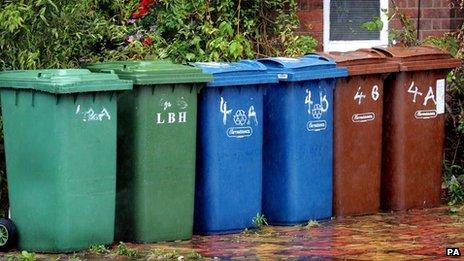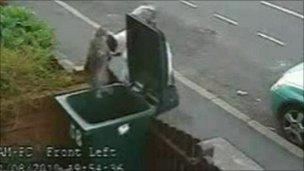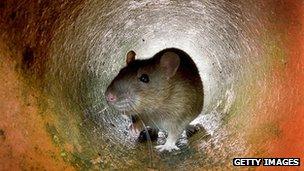Wheelie bins: Too good to refuse or a load of rubbish?
- Published

They can cause neighbour rows, block pavements for wheelchair users, be used to tackle a vermin problem and inspire business enterprise
Love them or loathe them, wheelie bins have become as quintessentially part of English life as cups of tea and rainy summers.
From bins being converted into toilets, external to women being caught on CCTV dumping cats in them, the wheeled receptacles are rarely out of the headlines.
Now Birmingham, one of the last - and biggest - parts of England where the bins are not supplied to homes, is in the process of introducing them.
The council says a £30m government grant means it can give two bins - one for recycling and one for general rubbish plus an optional third for garden waste - to every household.
The exceptions will be maisonettes, along with people who live on steep hills and other "unsuitable" areas.
Bins have been delivered to pilot areas Brandwood and Harborne before they reach the rest of the city, to bring it in line with 82% of England's councils.

Wheelie bins regularly make news, including when Mary Bale was caught dumping a cat in one
But critics of the bins say they clutter streets and are unsuitable for a city such as Birmingham which has a lot of terraced housing, meaning residents would have to wheel them through their homes, or store them permanently in front of them.
"It's a Marmite topic," said Councillor Bassam Mahfouz, who is in charge of waste for Ealing Council, in London.
His authority has only brought in wheelie bins in small parts of the borough that requested them - the rest of it, including areas of terraced housing, still use bin bags.
"You get the people who love them because they stop vermin like rats and mice from getting to their rubbish - and you get lots of people who hate them and think they signal the end of the world," he explained.
"Bringing them into one area at a time has its benefits though - I think sceptics see them working there, see the plus side, find out how other people overcome problems and realise it's not Armageddon after all."
'Spy' bins
Other councils have found other practical problems with them.
In Malvern, Worcestershire, original plans to give them to all households had to be abandoned over concerns they would roll down the town's famous hills.
The district council is still going ahead with introducing them but only in streets that have been tested for dangerous gradients, external.
In several towns and cities, the introduction of wheelie bins has also coincided with rubbish collections dropping from weekly to fortnightly.
In Hinckley, Leicestershire, the strength of feeling was so strong that when the wheelie bins were introduced in 2004, residents marched to the council's offices - with their bins in tow.
And over the decades, the seedy side of them has also emerged.
In 2007, South Yorkshire Police said inhaling toxic wheelie bin fumes had become the "drug of choice" for teenagers, external, and several murder victims have also been found dumped in wheelie bins.
Some residents found their bins were even spying on them, external after councils in some areas, including Bristol, started using microchips to monitor how much rubbish homes were throwing away.
Building fires have also been started by arsonists setting the bins alight.

Supporters of wheelie bins say they help prevent vermin such as rats getting to rubbish
And campaigners warn wheelie bins can become obstacles in Britain's already-cluttered streets and can be particularly hard to negotiate for parents with pushchairs, disabled people and those with sight problems.
Kevin Golding-Williams, from pedestrian campaign group Living Streets, said councils introducing wheelie bins had to check they did not become a nuisance.
"They're another part of street clutter," he said.
"Particularly when people have no front garden, they can just leave them out permanently on the pavement.
"Councils need to monitor the situation and check the environmental benefits the wheelie bins bring strongly outweigh the negative impacts."
Rows with neighbours
But there are lots of people who love wheelie bins - not least businesses that have emerged because of their existence.
From wheelie bin cleaners to firms that make wooden huts to cover them and stickers that identify which houses they belong to, everything has become a business opportunity.
Peter Bond owns BritishBins Ltd, which, among other things, sells wheelie bins to individuals who want their own, even if their local councils do not provide them.
"They might want them to transport the rubbish and keep the rats and mice out," he said.
"Different councils have different policies about what they do about emptying people's own bins - Bromley, for instance, are happy to empty them anyway but others, including Wandsworth, won't."
Mr Bond's website contains a newsfeed, external of all wheelie bin-related news from the local and national press and has researched the history of the bins - from their design in Germany to their introduction to the UK in the mid-1980s.
"You hear a lot of bad press when it comes to wheelie bins," he said.
"The stories you read in the likes of the Daily Mail include the worst cases of 'health-and-safety-gone-mad', including elderly ladies being asked to push bins long distances because binmen aren't allowed and the chips used to spy on people.
"You also hear a lot about rows with neighbours - people who have taken the wrong wheelie bin and others who have put rubbish in the wrong bin.
"One way or another wheelie bins have definitely made their mark on Britain."